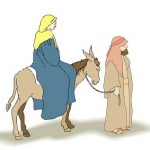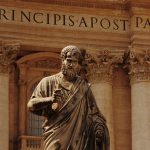
Image by Peggy und Marco Lachmann-Anke from Pixabay
Habakkuk 1:13 NIrV
“Your eyes are too pure to look at what is evil. You can’t put up with the wrong things people do. So why do you put up with those who can’t be trusted? The evil Babylonians swallow up those who are more godly than themselves. So why are you silent?”
Silence why?
As we see in verse 13 of chapter 1, the silence of God in the face of wickedness continues to puzzle Habakkuk.
- How do you react to the widespread violence, hatred, persecution, oppression and corruption reported in the media?
- Is there a particular news item in recent days that has caused you to feel like Habakkuk? “You can’t put up with the wrong things people do,…so why are you silent?”
- What’s your take on why the Lord does not punish the wrongdoers?
In verses 1:13 to 2:1 Habakkuk reveals his surprise at God”s intentions.
Puzzling over Silence
Habakkuk reveals his faith and trust in God when he says, “Holy LORD God, mighty rock, you are eternal, and we are safe from death” (1:12), yet He is nevertheless puzzled. God is holy, pure and righteous, so surely he cannot use such wicked people as the Babylonians!
The prophet questions the wisdom of God in overlooking the Babylonian (Chaldean) sins, and punishing His own people, Judah. In Habakkuk’s eyes they were, by comparison, far less sinful. Wouldn’t the use of the Babylonians bring dishonour upon God’s holy name?
- What are the things we do as a nation which bring dishonour to God’s holy name?
- How about in your own life?
An appeal in the silence
In the remainder of this chapter, Habakkuk goes on to again ask God not to overlook the Babylonian sinfulness but instead to judge them (Verses 13-17).
- Is there anyone in your life who deliberately makes your life difficult because you are a Christian?
- Why do you think does God allow …fill in the blank…to make life difficult for you?
Scripture shows us that God, for reasons often difficult to understand, often allows Satan and his minions to persecute His children.
Job in the Old Testament (or the first testament as our pastor suggested last Sunday) demonstrates this truth (Job 1:6-12). “The LORD said to Satan, “Very well, then, everything he has is in your power, but on the man himself do not lay a finger.” (Job 1:12 NIV) God’s permissive will enabled Satan to launch a full-scale attack on Job.
And in the New (or second) Testament Jesus told Peter, “Simon, Simon, Satan has asked to sift all of you as wheat. But I have prayed for you, Simon, that your faith may not fail. And when you have turned back, strengthen your brothers.” (Luke 22:31,32 NIV). We know that Peter did fail—in a way he would never thought possible—when he denied his Lord three times. But, praise God, his restoration came alongside the Sea of Galilee after Jesus resurrection (John 21:15-17)
Silence is golden
Job and Peter are by no means the exceptions. Jesus said, “Satan has asked to sift all of you.” That’s what our adversary seeks to do with all of us who follow Jesus. But notice, he needs God’s permission first. Although God gives the forces of evil a certain degree of leeway in making life difficult for us, if Satan wants to really turn up the heat, he needs to ask God first!
First, Satan has to seek God’s permission. Secondly, God may, and sometimes does, grant that permission. I wonder how often God refuses? That’s an encouraging thought.
The Bible teaches that we all get tested so that we can be ‘sifted’ of things that are detrimental to our witness for Christ. This is God’s way of refining us, like gold is refined (1 Peter 1:6,7 NIV). Job also proclaimed, “But he knows the way that I take; when he has tested me, I will come forth as gold” (Job 23;10 NIV).
Silence is temporary
Although God may allow Satan to sew his seeds of wickedness for a while, or even unleash a wholesale attack, He remains holy, and does not approve of wickedness. He has promised us that by faith we will overcome our enemy. That’s a thought to latch onto when things are tough.
1 Corinthians 10:13 NIV “No temptation has overtaken you except what is common to mankind. And God is faithful; he will not let you be tempted beyond what you can bear. But when you are tempted, he will also provide a way out so that you can endure it.”
1 John 4:4 NIV “You, dear children, are from God and have overcome them, because the one who is in you is greater than the one who is in the world”.
Dwight D Eisenhower made a clever statement:
There is no victory at bargain basement prices. Dwight D Eisenhower Share on X
Please join me in prayer.
Loving Heavenly Father thank you for the reminder that times of trial and persecution are allowed by You to put my faith to the test and sift me. Thank you too for the promise that in times of temptation you provide a way out so that I may overcome. Holy Spirit please help me to rely more on You so that I don’t lose my faith in Christ but instead overcome the powers of darkness. I pray these things in Jesus’ glorious name. Amen.
P.S.
If you haven’t yet read the background to the prophecy, please do. It will benefit you throughout this series of studies.





















